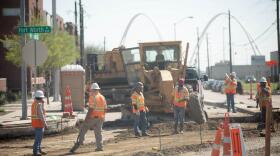Earlier this month, after the Trump administration ordered travel restrictions, many Americans jumped onto flights and returned to the U.S. But soon after, horror stories started to emerge as airports became densely populated.
Now, one of the people who stood in the hours-long line for screenings has tested positive for coronavirus. She worries others may have the same fate. Her doctor and other travelers also discussed their fears about the screening processes at international airports.
For the past 10 days, Emma Swaim has been self-quarantined in her bedroom at her parents' home in Irvine, California. The 21-year-old tested positive for COVID-19 five days ago. Her symptoms include intense headaches and on-and-off again nausea.
"I have body aches like I've never had a body ache before. Like where it feels like someone took a hot rod and put it in your limbs," Swaim said, sporting a robe and ponytail during a video chat.
Swaim previously described her time at Dallas-Fort Worth International Airport as "the most disgusting close contact with strangers" she had ever experienced.
"I waited in a line for over three hours with people who I now am very confident had coronavirus," she said.
Swaim was one of several thousands of travelers who packed into the airport that Saturday. She was returning home from a study abroad trip in Paris. Her descriptions of DFW International Airport, packed so tight that people's coughs could be felt on her neck, mirror those shared on social media from DFW and other airports across the country.
"When I was going through Dallas [on my layover] it was almost like watching the end of the world," said Swaim. "It's very interesting to watch the government try to control something I think is really out of control."
Swaim admitted that she knew things would be hectic when she arrived at DFW. She said she knew screenings were going to take place and imagined it would be like what she saw on social media.
"You know, I had seen in China they just had passengers coming off of the planes and [then] they would hit you with a little thermometer laser," said Swaim. "Then, they'd call it a day."

But that's not what happened. Swaim said passengers were simply given forms to fill out.
"It's sort of like when you land and they have you do your customs paperwork on the plane – it was just like that. But asking if you have coronavirus," she said with a laugh.
A spokesperson for Dallas Fort Worth International Airport said screening wait times have decreased dramatically. They added that Customs and Border Protection were and are still in charge of processing, screening and all procedures.
The airport had no comment on whether Swaim, and possibly hundreds of others, could have been exposed to coronavirus while packed into long customs lines.
In a statement to KERA, CBP said they've been working with international airports, and local and federal partners to ensure an "efficient and safe process flow for the traveling public."
The statement added that CBP continues to facilitate the CDC's enhanced health screening of travelers entering the U.S. The CDC is responsible for enhanced health screenings of travelers at all 13 U.S. locations.
The CDC did not respond to requests for comment.

In the days since #DFWairport was trending on social media, people returning to the U.S. through Dallas are still posing questions about the screening process.
Last week, Sarah Reyes and her partner Daniel Driensky, went through the same process as Emma Swain. The Dallas-based videographers had been filming a documentary in Nepal and said they made plans to come back as soon as travel restrictions were announced. Driensky said he thought he and Reyes would be tested or at least have their temperatures taken to ensure they don't have symptoms.
"But we got to Dallas and there was nothing like that," he said. "Just a questionnaire that asked if we had symptoms. I could easily see where someone would lie and just say they didn't have symptoms to get in."

Reyes said she was shocked there wasn't more rigorous testing by the CDC. The pair had been on several flights in Nepal and were tested multiple times before entering and after exiting aircrafts.
"Each of the flights that we were on, I mean, they were packed, because flights were being canceled," she said. "And the likelihood that somebody in there could have COVID-19 was probably – you know – high!"
The pair hasn't shown any signs of illness, but said they're worried about their interactions at the airport.
Meanwhile, Swaim said she's feeling lucky. She quickly received help and is on the mend, but she's worried about what happens next.
"My fear is like, 'Oh. Is this going to get really really bad and I'm gonna be someone who can't breath?! Or is this over now?' I don't even know."
Neither do any of the thousands of people who were at DFW Airport on March 14. Someone else might've caught the virus on that day. But officials haven't made any announcements.





